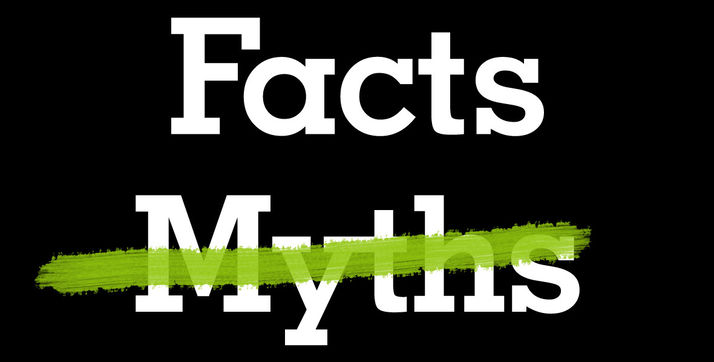Diet and Exercise Myths, the Truth, and Pro Tips
You can find anything on the Internet these days—whether it’s pictures of cats, double rainbows, or questionable health advice. But when it comes to your diet and exercise, the last place you should be getting your information is from unverified social media posts. Many of those are simply opinions based on anecdotal evidence or marketing ploys trying to sell you something. In this article, I’ll clear up a few common myths using evidence-based research from top professionals in the fields of health and science. So let’s set the facts straight!
Myth 1: You should do fasted cardio to burn the most fat!
Many people believe that exercising on an empty stomach (also known as fasted cardio) helps burn more fat because your body will tap into stored fat for energy.
The Truth
This claim is not supported by solid science. In fact, research has shown that eating something before your workout can boost your overall energy expenditure throughout the day. Studies suggest that consuming a light snack before exercising can result in a 20% increase in total energy expenditure compared to fasted cardio. When your body has access to readily available nutrients, your workouts can be more efficient, and you may perform at a higher intensity, which leads to better long-term fat loss. So, go ahead and grab a small pre-workout snack—your body will thank you!
Pro Tip
A combination of carbs and protein, such as a banana with peanut butter or a small yogurt, can fuel your body and improve workout performance.
Myth 2: Don’t eat after 8pm, or 7pm, or is it 5pm?
The Truth
This is one of the most persistent myths out there, but the truth is that when you eat is far less important than what and how much you eat. Studies have shown that as long as you are in a caloric balance (meaning you’re not eating more calories than your body needs), the time of day you eat has very little impact on your weight. Your body processes calories the same way whether it’s 8 AM or 8 PM. It’s the quality and quantity of food that matters.
In fact, some people find that eating dinner later can fit better into their lifestyle or improve satiety, preventing late-night snacking or cravings. Rather than focusing on the clock, prioritize maintaining an overall healthy diet and eating in a way that aligns with your energy needs.
Pro Tip
If you feel hungry at night, opt for lighter snacks such as Greek yogurt, a handful of nuts, or a piece of fruit to avoid overeating.
Myth 3: Certain foods have negative calories, like cucumber and popcorn.
Some foods are said to have “negative calories,” meaning that your body uses more energy to digest them than the calories they contain, effectively canceling them out.
The Truth
While it’s true that your body does expend energy to digest food (known as the thermic effect of food), no food has truly “negative calories.” Typically, about 10% of the calories in the food you eat are used for digestion, but that still leaves plenty of calories behind. For example, eating a 25-calorie cucumber might use about 2 calories for digestion, but you’re still consuming 23 calories overall. The idea of negative-calorie foods is more wishful thinking than a legitimate strategy for weight loss.
Pro Tip
That said, foods like cucumbers, leafy greens, and other low-calorie vegetables are still excellent choices for weight management because they are nutrient-dense and low in calories. They keep you full without adding many calories, but they won’t magically make you burn fat just by eating them.
Myth 4: Don’t eat fruit as it can make you fat because it is high in sugar.
Since fruit contains sugar, some people believe that eating it will lead to weight gain or fat accumulation, especially when compared to other low-carb diets.
The Truth
While fruit does contain natural sugars, it also provides essential vitamins, minerals, antioxidants, and fiber that are crucial for your health. The sugar in fruit is far less concerning than added sugars found in processed foods. Studies consistently show that individuals who eat more fruit tend to have lower rates of obesity, heart disease, and other chronic conditions.
The key is to eat fruit in its whole form rather than drinking fruit juices, which can lead to rapid spikes in blood sugar. Whole fruits come with fiber that helps regulate the digestion of sugar, preventing blood sugar spikes and keeping you feeling fuller for longer. So, unless you’re dramatically over-consuming fruit (which is rare), there’s no need to worry about fruit causing weight gain.
Pro Tip
Aim for a variety of fruits in your diet to get the full range of nutrients and enjoy fruits as a snack or dessert to satisfy sweet cravings healthily.
Conclusion
I hope this clears up some of the confusion surrounding these common diet and exercise myths. Remember, sustainable health is about balance, informed decisions, and trusting evidence-based practices rather than fads and misconceptions. If you’d like to learn more about proper nutrition and exercise strategies, schedule a free health assessment with one of our certified professionals. We’ll help you bust more myths and get on track toward achieving your goals!
PTF™ is Changing Lives Every Day
Through nutrition coaching and personal training, Pledge To Fitness® is here to help you navigate your health and fitness journey with the right information and support. Let’s get started on busting those myths and helping you achieve real results!



